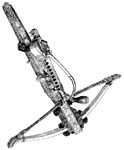
The Martyrs of Gorcum
"FORNICATOR I ALWAYS WAS, HERETIC I NEVER WAS"
Today, when many Catholics seem to regard the Real Presence of Christ in the Eucharist as inconsequential (they wouldn’t mind if the bread were just bread, really), and when many seem to regard the Pope’s headship of the universal Church as a kind of embarrassing error (they wouldn’t mind if the Pontiff were just a Chairperson, really) — at such a moment it may be good for us to recall the careers of a group of Catholics who realized, when asked to disavow the Eucharist and the papacy, that they minded very much. They minded so much that the threat of death — and the promise of life, if they would acquiesce — could not move them.
They were 19 priests and brothers suddenly put to the test one day when their routine was shattered by an unexpected act of war, and they are known as the Martyrs of Gorcum. Gorcum was a little town on the seacoast of Holland, and one June day in 1572 it became the scene of a religious drama with mortal consequences. Holland, like all of Europe at the time, was fragmented religiously and disordered politically; under the rule of Spain, Holland was restively seeking national independence. Europe was in the throes of Reformation and Counter-Reformation, and even a peaceful village of farmers and fishermen such as Gorcum might be touched by these wider currents. Gorcum had a couple of Catholic parishes and a Franciscan friary, but the next town, Briel, was largely Calvinist.
On June 26, 1572, a kind of private armed force under the Baron de la Marque sailed into Gorcum and took over the town. Called the Watergeuzen (the Sea Beggars), they were, frankly, pirates, but they were also staunch Calvinists whose anti-Spanish politics meshed comfortably with their anti-Catholic theology. These freebooters were convinced that Catholicism had to be wiped out, and they began rounding up all the priests and brothers they could find.
We know the names of these sudden prisoners: Fr. Leonard Vechel, pastor of Gorcum, and his curates, Fr. Nicholas Jannsen and Fr. Godfrey van Dunyan. The guardian of the Franciscan friary, Fr. Nicholas Pieck, was captured, and his priests with him: Fr. Jerome van Weerden, Fr. Anthony van Hoornaer, Fr. Anthony van Weert, Fr. Theodore van der Ems, Fr. Godfrey van Mervel, Fr. Nicasius Jannsen, and Fr. Anthony van Willehad, who was about ninety years old. With them were two lay brothers, Cornelius van Wyk and Peter van Assche. Also captured were an elderly Augustinian canon, Fr. John Oosterwyk, and two Norbertine priests, Fr. Adrian van Hilvarenbeek and Fr. James Lacops (a problem religious, rebellious, defiant of authority, and most unobservant of his religious duties). There was also a Dominican father, John van Hoornaer, who when he heard of the trouble came to aid his brethren. He was seized after conducting a clandestine baptism in the woods.
You May Also Enjoy
As aliens yearn
For the native land.
We still return
To the garden —
Taste…
Political correctness (PC) began around 1968, when the American Left yielded to intense neotribafism. PC…
Tolkien’s The Hobbit or There and Back Again is the quintessential quest story. Familiar places…

